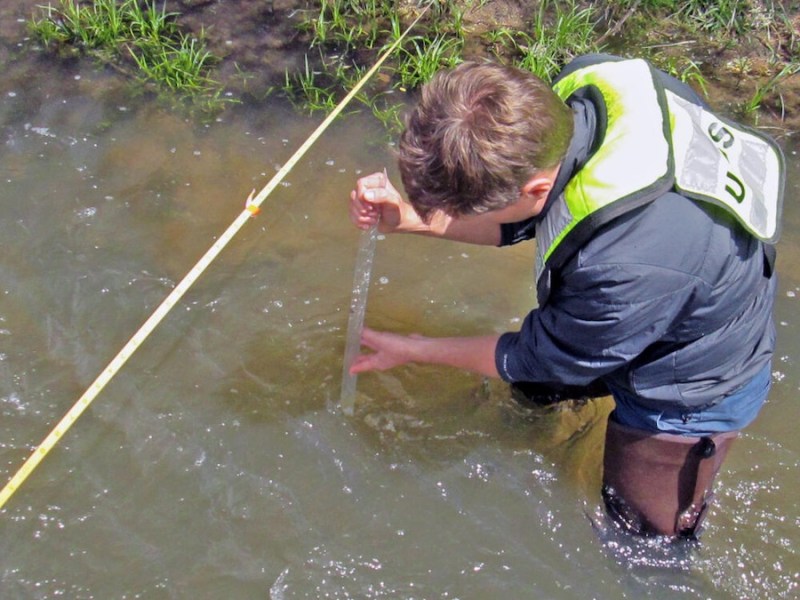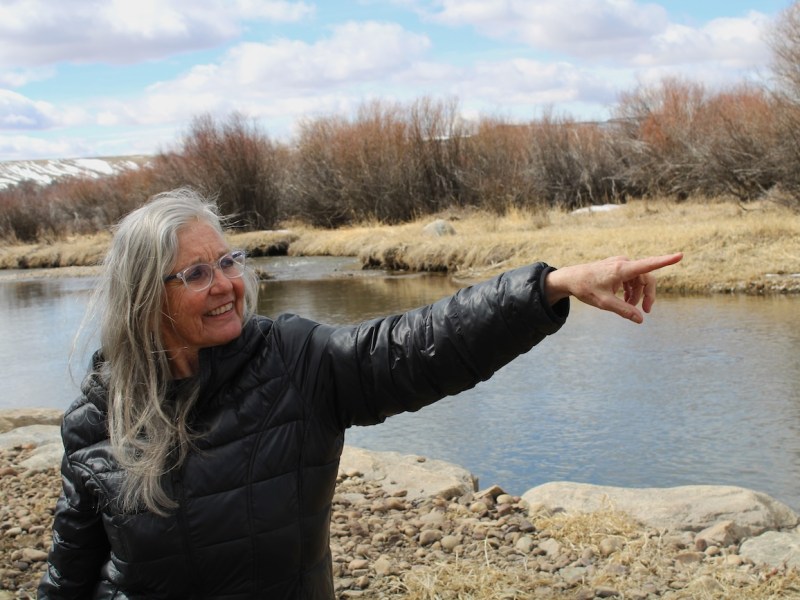Wyoming’s federal delegation has filed legislation to restore millions of dollars to pay state irrigators in the Colorado River Basin for conserving water.
Bills filed in the U.S. Senate and House would restore the System Conservation Pilot Program that Congress ended in December. The program contracted to pay $8.3 million in 2023 to 21 entities in Wyoming,
The conservation effort aims to supply more water to downstream states without harming Wyoming water users. Headwater upper-basin states of Wyoming, Colorado, Utah and New Mexico favor voluntary paid-for conservation over uncompensated reductions proposed by California, Nevada and Arizona.
The seven Colorado River Compact states propose competing programs to share dwindling flows in a river system that supports some 40 million people in the southwest and Mexico.
It’s uncertain whether the bills might enable the conservation program this year, according to members of the Upper Colorado River Commission who met Tuesday.
“With that uncertainty,” said Wyoming State Engineer Brandon Gebhart, “the four of us as [upper-basin] commissioners haven’t had sufficient time to figure out what a program would be.”
“The future of System Conservation Pilot Program legislation remains unclear, as does federal funding.”
Becky Mitchell
He made his remarks to fellow commissioners Becky Mitchell, Gene Shawcroft and Estevan Lopez representing Colorado, Utah and New Mexico respectively.
The federal representative on the commission, Anne Castle, resigned on Jan. 28 as requested by the Trump administration, according to her resignation letter obtained by journalist John Fleck. She stated she was worried that the administration’s policies are creating “a more disordered and chaotic Colorado River system.”
Bills moving
The pilot program contracted with 21 entities to conserve 15,571 acre feet of “consumptive use” in 2023, according to the latest report posted on the commission’s website published in June 2024. Eighteen of the contracts offered ranchers up to $611 an acre foot for water left in the stream.
(A report on the 2024 program has not been posted on the commission’s website, but could be available this summer if the previous publication schedule is followed.)
The four states and federal government had hoped to continue the program in 2025, but it expired in December when the U.S. House failed to reauthorize it.
“Last year, the Commission was hopeful that the SCPP would be reauthorized and could be used as a potential tool,” Mitchell, the chair of the Upper Colorado group said at the meeting. “However, that federal package that we saw [at] the end of last year did not include much in the way of natural resources legislation.”

Although bills to resurrect the program have been filed, “the future of SCPP legislation remains unclear, as does federal funding,” she said. In 2023, the multi-state program administered by the Bureau of Reclamation received $125 million through the Biden administration’s Inflation Reduction Act.
The Colorado River Basin System Conservation Extension Act would extend the program through 2026, at which time stopgap rules governing drought allocations expire. U.S. Sen. John Hickenlooper, a Colorado Democrat, sponsored the Senate version with U.S. Sens. John Barrasso and Cynthia Lummis, Wyoming Republicans. U.S. Rep. Harriet Hageman, also a Republican, has offered a version in the U.S. House.
“Our bipartisan legislation extends these important programs to help address drought issues across our states.” Barrasso said in a statement. Lummis called the program “forward-thinking.”
Hageman said the pilot program to pay ranchers allows irrigators and water managers a chance to explore alternatives to “severe water regulation during droughts.”
Both bills have begun to advance in their respective chambers.
Piney creeks, Little Snake River
The 2023 program saw significant contracts awarded in the Little Snake River drainage in Carbon County and also around Big Piney in Sublette County.
The largest single contract was for $2.6 million in the Little Snake. Irrigators along North, Middle and South Piney creeks collectively signed up for $3.4 million.
By the end of the 2023 summer, a consultant estimated the program conserved 8,477 acre feet of water or about 55% of the 15,507 acre-foot contracted goal for Wyoming, according to calculations made from the 2023 Upper Basin report.
In the Piney creeks area, the program saved about 55% of the stated goal, in the Little Snake about 42%.
“In all cases, the participant completed the required conservation activities,” the 2023 report states. “Variation in average estimated [conserved consumptive use] and actual [conserved consumptive use] is to be expected” due to annual variations in temperature and precipitation, the report said.
In theory, the water that ranchers — plus one municipal and one industrial entity — did not use would flow on to Lake Powell. That would help prevent lower basin states from demanding their share — allowed under laws, compacts and agreements — and forcing reductions in upper basin usage.
Myriad factors complicate that concept, however, including whether conserved water actually makes it to the reservoir, how and whether upper basin states are credited for conserved water, what toll evaporation takes and more.
What’s not complicated is the impact of diminishing river flows to the economy of Wyoming’s Green River and Little Snake River basins and Cheyenne, which uses Colorado River Basin water diverted across the Continental Divide.
“Hydraulic shortages, the increased variability and the changed timing of the available water supply increases the uncertainty to all of our water-use sectors,” Gebhart told fellow commission. “If our farmers and ranchers are forced to reduce or eliminate the herd size because they don’t have the water to grow the food, it can take many years to recover and regrow these herds.”
There are larger implications, he said.
“These shortages also impact the fish, wildlife, wetlands, the riparian areas, and that has an impact on our tourism [and] recreation sectors,” Gephart said. “Not only do [lower flows] negatively impact our economy, but they impact our culture, and it impacts the relationships that have evolved and exist between all of our water use sectors. This can create conflict.”





Elections have (checks notes)… consequences. The people of WY and America need to start growing their own food. 1/4 acre tended garden when cared for can wean you off the majority of our subsidized, herbicide saturated, GMO, nutrition free junk. A victory garden is a fine protest in these corrupt times and emotionally soothing. Tear up your lawns and plant some veggies.
Brasso and Lummis see the people of WY as an ATM and disposable labor. If it’s coming out of their mouth, it’s a lie.
Didn’t John Wesley Powell warn us some time ago?
Yes, that was over 100 years ago but we didn’t listen.
Wyoming is studiously ignoring the Atom Trap Trace Analysis (ATTA) technology which allows tracking water flows. Not only can ATTA determine the elevation of water entering the aquifer (within 100 meters), but it can determine how long the water has been underground. It has also been used to track underground flows.
Unfortunately, the politics of water are threatened by science & technology. Wyoming is retreating from the Best Available Technology, to myths, symbols, and rituals.
Here we go again. Ranchers and farmers using tX payers dollars to spend on “their” personal business endevors. Yes they may be tax payors but that usage ends when they have a business. They should not be allowed to us tax money to cover their business needs.
I understand the need for the SCPP program. It will come at a cost down the road. Ranchers have created an underground reservoir of water over the decades with flood irrigation of their hayfields in the Green River basin. This program over time will deplete that reservoir. Once those underground reservoirs start to dry up we can begin to lose water wells and all the habitat for not only there livestock but for all the wildlife that survives because of their efforts over the years. It will eventually damage their first cutting of hay. This is not a long term answer for anyone. I personally believe it’s dangerous.
Trump cuts. It can hurt.
Trump is going to shut it all down, forget it, u voted for him.
we must build some water projects my fellow americans
Alas. It appears that the Wyomingites’ enthusiasm for reducing federal spending applies only to spending elsewhere. Add to that the unwelcome truth that if Wyoming’s irrigated agriculture disappeared tomorrow, there would be local impacts, but the nation would be none the wiser. Prepare for many other tales of public applause for sweeping budget cuts immediately followed by frantic efforts to restore funding for the cause of the day. I don’t have a problem with federal spending. Those who do need to recognize that everyone thinks their projects are worthy, and if you want cuts, you have to take your lumps too.
I agree with Sarah. In addition to only being in office to benefit themselves, our delegation are absolute hypocrites and spineless sycophants of the orange turd. They are an embarrassment to our state and our democracy. Hageman is crazy as a loon.
Agreed!
Hmmmmmmm, would another way to call this action “SUBSIDIZED WATER CONTROL” just look how subsidized farming is turning out for the small to medium farmers they almost can be called dinosaur, extinct.
Semper Fi!
Contact your congressman and ask them to support these bills so farmers/ranchers can get paid to not use the water they would have used if they were growing the crops that we pay them not to grow on land that is assessed at less than it’s real present day value.
There are a lot of farmers who are going to miss USAID this year when that organization is not there to buy hundreds of millions of dollars worth of farm commodities for distribution around the world. Even now those commodities sit rotting away on docks and in warehouses around the world for lack of distribution.
President Elon has not turned his attention to the BLM, USDA, and farm subsidies yet. That will make some headlines.
Important news on progress. The southern states on the Colorado River are making major progress conserving water especially the Imperial Valley Irrigation District as per the following article:
” IID, growers conserve over 1.2 million acre-feet of water in two years.”
This conservation has significantly contributed to the level of Lake Mead actually rising which eases the pressure on Flaming Gorge to release more water. Its encouraging to know that Wyoming irrigators are not the only ones contributing to water conservation. Please note that in Angus’s article he mentions water being transferred across the continental divide for usage in the front range of Colorado. Thats taking water out of the Colorado River drainage and redirecting it to a new reservoir above Loveland. The implications of trans continental divide water diversion are major – thats taking water out of lake Mead!!!
It is vital that the proposed legislation include a provision that expressly prohibits the President from ordering releases from federally funded reservoirs and dams without obtaining the consent of the state governor where it is located. Trump is a city-boy, a dude. All he knows about water is that you just turn a tap or valve and there it is. Look what happened in California; millions of acre-feet released on his order just to seep away or evaporate.
Thanks for shining light on this, Angus.